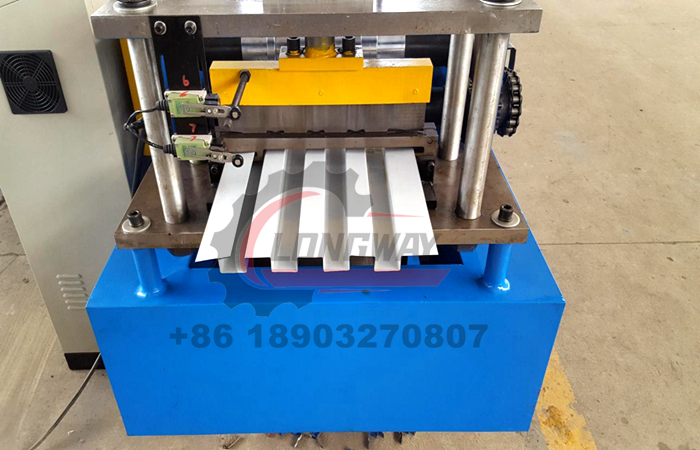Fascia Roll Forming Equipment Manufacturer for Efficient and Durable Construction Solutions
Exploring the World of Fascia Roll Forming Machine Companies A Comprehensive Overview
In the realm of modern manufacturing, fascia roll forming machines play a pivotal role, especially in the production of building materials that are not only functional but also aesthetically pleasing. These machines are designed to create fascia boards—an essential element in construction and architecture, providing a finished look to roofs while protecting the underlying structures. In this article, we will delve into the significance of fascia roll forming machine companies, their technology, benefits, applications, and the future of this vital manufacturing sector.
Understanding Fascia Roll Forming Machines
Fascia roll forming machines are specialized equipment that transforms metal coils into custom-shaped fascia boards through a series of progressive forming stations. The process involves feeding a continuous strip of metal, often galvanized steel or aluminum, through rollers that gradually shape the material into the final product. This method not only ensures precision but also enables high-volume production, which is critical in meeting the demands of modern construction.
The Role of Fascia Roll Forming Machine Companies
These companies are at the forefront of innovation in the construction materials industry. They maintain a delicate balance between quality and efficiency, ensuring that their machinery meets rigorous industry standards. These manufacturers often offer a range of machinery types, from basic models to fully automated lines equipped with advanced technologies such as programmable logic controllers (PLCs) and real-time monitoring systems. The continuous evolution of these machines reflects the growing complexity of architectural designs and the need for rapid production cycles.
Benefits of Using Fascia Roll Forming Machines
1. Customization One of the most significant advantages of fascia roll forming machines is their ability to produce custom shapes and sizes. This flexibility allows architects and builders to implement creative designs without being constrained by the limitations of pre-fabricated materials.
2. Cost-Effectiveness While the initial investment in a roll forming machine may be substantial, the long-term savings are considerable. These machines operate with minimal waste and can produce high volumes of fascia boards quickly, reducing labor costs and material expenses.
3. Durability The materials used in fascia production, often treated for weather resistance, ensure that the final products are durable and long-lasting. This not only enhances the building's longevity but also minimizes maintenance efforts for homeowners.
fascia roll forming machine company

4. Energy Efficiency Modern fascia roll forming machines are designed with energy efficiency in mind. By employing advanced technologies, these machines reduce energy consumption during production, aligning with global sustainability goals.
Applications Across Industries
Fascia roll forming machines find applications across various industries. In residential construction, they provide essential elements for roofing systems. In commercial architecture, large-scale projects benefit from the ability to create consistent, high-quality fascia that enhances the building's aesthetic appeal. Additionally, the automotive industry utilizes similar forming techniques for parts that require precision and strength, demonstrating the versatility of the technology.
Challenges Faced by Fascia Roll Forming Machine Companies
Despite the numerous advantages, fascia roll forming machine companies face challenges. The rapid pace of technological advancement requires continuous investment in research and development. Moreover, fluctuating raw material prices can impact production costs. Additionally, the global supply chain disruptions witnessed during recent events highlight the need for companies to diversify their sourcing strategies.
The Future of Fascia Roll Forming Machine Companies
Looking ahead, the future of fascia roll forming machine companies appears promising. The ongoing trends towards sustainability in construction are pushing these companies to innovate further. The integration of smart technologies, such as IoT and artificial intelligence, into machinery is likely to enhance operational efficiencies and product quality. Furthermore, as the demand for eco-friendly building materials rises, companies that adapt to these changes will emerge as leaders in the market.
Conclusion
Fascia roll forming machine companies are vital components of the modern manufacturing landscape. Their ability to deliver customized, high-quality products efficiently positions them as indispensable partners in construction and architecture. As these companies embrace innovation and navigate challenges, they will continue to shape the future of building materials and contribute to the creation of sustainable, durable, and aesthetically pleasing structures. The industry is indeed on the brink of exciting transformations, and the role of fascia roll forming machines will be paramount in driving this evolution.
-
Roof Panel Machines: Buying Guide, Types, and PricingNewsJul.04, 2025
-
Purlin Machines: Types, Features, and Pricing GuideNewsJul.04, 2025
-
Metal Embossing Machines: Types, Applications, and Buying GuideNewsJul.04, 2025
-
Gutter Machines: Features, Types, and Cost BreakdownNewsJul.04, 2025
-
Cut to Length Line: Overview, Equipment, and Buying GuideNewsJul.04, 2025
-
Auto Stacker: Features, Applications, and Cost BreakdownNewsJul.04, 2025
-
Top Drywall Profile Machine Models for SaleNewsJun.05, 2025








